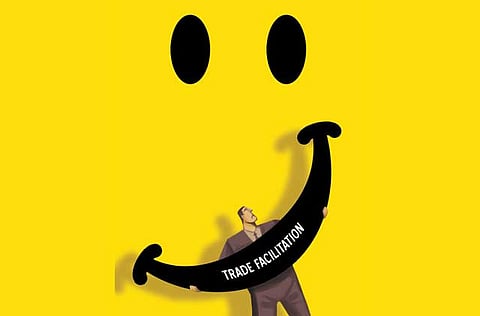Trying to balance higher productivity and jobs
It has to be seen whether trade facilitation deals manage to strike a balance

Can trade reduce poverty? Can the Bali deal do any good?
Let me lay out a scenario of a population where each owns land of equal size and is given a specific amount of money to invest as they wish. There is one condition here; it should go into production of agricultural products. Let’s also mention here that this would include human capital — labour — in the production process.
What determines how much a person should invest is usually based on how much he can produce the commodity for. The cheaper it is, the more reluctant he would be to get into its production. This is what comparative advantage is about. (Absolute advantage — the production of everything cheaper than everyone else — does not really exist except in economics books, which is why it’s going to be sidelined here.)
After people specialise, they start producing and trading. Trade agreements make the movement of products easier from one place to another, providing access to bigger markets and more consumers.
To better address the effects of trade facilitation, one must look at the effect on producers and consumers in the countries involved. Our case here would be the EU, and how almost every European country envies Germany for enjoying a budget surplus when they struggle with their sluggish growth in exports.
This is one major setback from having a single currency. Since no one country can devaluate the currency, competition rests mainly with having better products and increased ease in doing business and trade.
Germany does excel in these, while other European countries need to work harder for their products to sell. As a common market, an issue occurs when EU signs a trade facilitation agreement or a free-trade agreement with another country or economic bloc. One reason why the EU and Argentina cannot get their FTA signed yet is Ireland’s opposition.
Ireland produces meat at a higher cost than Argentina, meaning that the latter has a comparative advantage in this. Eventually, Ireland’s meat producers will go out of business as they can’t match the lower costs in Argentina, while Argentinian producers and EU consumers will benefit. Jobs will be created in Argentina, and jobs will be lost in Ireland. How are we to measure the trade facilitation effect here?
Building on our example, and as Argentina exports more meat, foreign companies will relocate to Argentina to enjoy the lower production costs. When that happens, the cost of production drops, especially as these producers enjoy global economies of scale.
If a local producer cannot match that, they go out of business just as happened to Irish producers earlier. Not only that, if a monopoly is established as local producers exit the market, consumers in Argentina will suffer higher prices while their counterparts in the EU will no longer feel the price reducing effect of trade facilitation.
Some may argue that Irish producers can get back into business at that point. True. But are these guys waiting for that to happen? And even if they did, or if they had to switch to meat production from whatever careers they undertook after losing their businesses, who’s going to quantify the loss generated by the shift from one field to another?
By the end of the day, and for everyone to be happy, jobs created in Argentina and Ireland should be more than jobs lost for the net effect to be positive. And regardless of whoever produces meat, prices should be lower for consumers in the EU and in Argentina for the trade facilitation agreement to be fruitful.
The trade facilitation agreement signed in Bali is predicted to generate an increase of $40 billion (Dh147 billion) in incomes worldwide. So jobs created should exceed jobs lost.
However, the proportion of jobs created and lost in countries, like Ireland and Argentina in our example, will vary widely. No one can predict the exact effect, but someone somewhere will be unhappy.
Moreover, wages might have increased and contributed to an increase in income worldwide, but with fewer jobs offered. And we will have more unhappy people.
Comparative advantage will decide where what will be produced as long as trade is facilitated, and proper infrastructure allows the movement of products to be exported and sold in markets beyond a country’s borders. To answer the question asked at the beginning of the article, yes, trade facilitation should reduce and even eradicate poverty as economic productivity increases worldwide.
But people out of jobs might have to relocate to countries where production is now taking place, as long as the pay guarantees higher purchasing power back home. Now the last thought that I want to leave you with is: What happens to host countries when most of the income generated is remitted back home, shifting jobs and labour back there?
The writer is a commercial consultant and a commentator on economic affairs. You can follow him on Twitter at www.twitter.com/aj_alshaali.
Sign up for the Daily Briefing
Get the latest news and updates straight to your inbox



